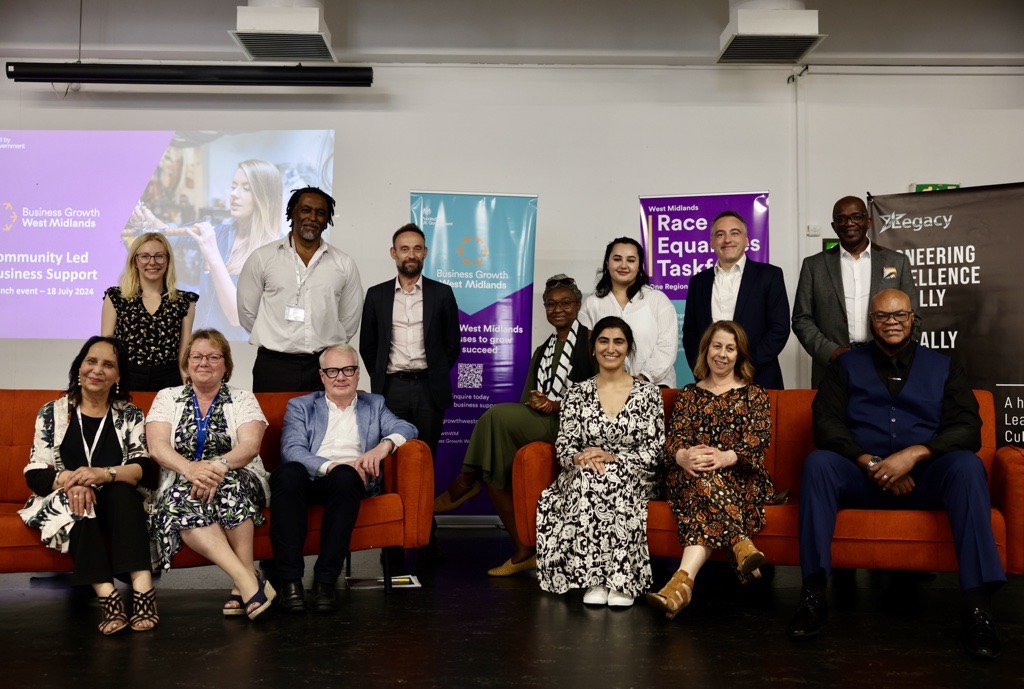Community led business support to drive economic growth in diverse neighbourhoods
Published: 02 August 2024
Entrepreneurs in some of the region’s most ethnically diverse communities are to get better access to support and advice to help grow their businesses through a new network of community led business hubs.
Thanks to a £270,000 investment from the West Midlands Combined Authority (WMCA), five established community organisations will work with the region’s Race Equalities Taskforce and Business Growth West Midlands to connect local entrepreneurs to regional business support.
All five hubs will be run by organisations that already have a strong track record of supporting diverse communities by connecting them with new opportunities.
They are:
- Highlife Centre in Coventry
- iSE Women’s Enterprise Hub in East Birmingham
- Legacy Centre of Excellence in North Birmingham
- Skills Work and Enterprise Agency (SWEDA) in Sandwell
- Access to Business with Wolverhampton Black Business Network
The targeted business support will help grow the region’s economy while supporting the West Midlands Race Equalities Taskforce’s commitment to help even more people from ethnically diverse communities unlock their full potential by overcoming barriers to success.
This is the second major investment by the WMCA in this part of the economy.
Earlier this year, the WMCA and the Taskforce handed £100,000 to Aaina Community Hub in Walsall to help extend its skills and enterprise support for local residents and boost its own resilience, so the hub can secure further external funding in the future.
Aaina is working closely with the five new community led business support hubs to share early learnings and work together to improve lives for disadvantaged communities across the region.
Funding for the five new community led business support hubs is coming from the UK Shared Prosperity Fund.

Pictured: Lucy Gosling, WMCA’s Race Equalities Taskforce programme manager; Dez Ferguson, SWEDA business advisor; Ian McLaughlan, from Business Growth West Midlands; Roze Navaab, The Highlife Centre, Paul Edwards, WMCA’s head of economic development and delivery; Paul Knight, director at Legacy Centre of Excellence, and, front, Davinder Kaur, SWEDA chief executive, Josie Kelly, Access to Business chief executive; Mayor Richard Parker; Christabell Amoakoh, The Highlife Centre chief executive; Sharonjit Clare, Race Equalities Taskforce independent chair; Sue Collins, Initiative for Social Entrepreneurs project manager, Keith Shayaam-Smith, Legacy Centre of Excellence chief executive.
Richard Parker, Mayor of the West Midlands and WMCA chair, said: “I want the West Midlands to be the best place to live, learn and do business. No one should be held back from making the most of their lives, particularly not because of their race.
“I’m delighted that we’re backing businesses by launching support hubs right in the heart of our diverse communities. This is how we’re going to break down barriers to their growth, help more business owners succeed and re-ignite our region’s economy.
“Only with all of us reaching our full potential will the West Midlands thrive.”
Sharonjit Clare, independent chair of the West Midlands Race Equalities Taskforce, said: “We know from Aston University’s Centre for Research in Ethnic Minority Entrepreneurship that ethnic minority communities are more likely to start businesses, but that they also find it harder to grow and sustain them.
“In the Taskforce’s Race Forward report, we have identified the need to invest in community hubs as an accessible source of skills and enterprise support.
“This pilot is about working together and pooling resources across the Taskforce, Business Growth West Midlands and the hubs. Our collective aim is to offer a whole generation of entrepreneurs better access to available funding, growth programmes and opportunities to diversify into new and emerging sectors.
“By working together, we can also enable the community hubs to boost their reach, resilience and impact, and secure further investment.”
The West Midlands is becoming more ethnically diverse with Census data from 2021 showing around 1.3 million (45 per cent) of the region’s population did not identify as being from a White British background - a significant increase from the 34 per cent a decade before.
The West Midlands Race Equalities Taskforce was set up by the WMCA in 2022 to look at the specific issues facing under-represented communities to ensure that everyone benefits from the success of the region.
The Taskforce’s first five-year strategy, published last year, focuses on helping people in ethnically diverse communities to access and benefit from better jobs, transport and housing, and tackle disparities in education, health and criminal justice.

